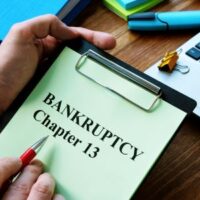How Does a Chapter 13 Plan Work?

Filing for personal bankruptcy can be an extremely complicated process, but an experienced bankruptcy lawyer in South Florida can assist you with all aspects of your case, including the Chapter 13 plan if you are intending to file for Chapter 13 bankruptcy. What is a Chapter 13 plan and how does it work? Given that Chapter 13 bankruptcy is a type of reorganization bankruptcy, a debtor will repay secured and priority debts over time, and portions of other debts, through a repayment plan that typically lasts from three to five years. We can provide you with more information about how the plan works, including how you get your proposed plan confirmed and what it must include. Once you are ready to begin thinking about filing for Chapter 13 bankruptcy, a lawyer at our firm is here to assist you.
File Your Repayment Plan Within 14 Days of Filing Your Bankruptcy Petition
In Chapter 13 cases, the debtor has an opportunity to draft their own proposed repayment plan (usually with assistance from an experienced attorney). In order for the bankruptcy court to be able to consider the debtor’s proposed plan, the debtor must submit the plan either with the initial bankruptcy petition (i.e., when they file for bankruptcy) or within 14 days of filing the bankruptcy petition.
How the Payment Schedule Needs to Work
When you are drafting a proposed repayment plan, it is important to understand the type of payment schedule the court is expecting. In general, your bankruptcy plan needs to propose making fixed payments to the bankruptcy trustee in your case regularly. In most Chapter 13 plans, the debtor will make fixed payments either on a biweekly or monthly basis. The trustee is then responsible for distributing the money to the debtor’s creditors.
Repayment Plan Must Pay Certain Claims in Full
All priority claims must be paid in full by the end of a Chapter 13 plan, and secured claims also typically are paid in full. The remaining amount that must be paid of the debt owed will depend on factors that include the debtor’s disposable income and the exemptions for which the debtor may be eligible (the debtor must use Florida exemptions).
Making Payments and Court Approval
Once 30 days have passed after the debtor submits the proposed plan, the debtor must start making payments according to the plan even if the court has not yet approved it. Within 45 days of the meeting of creditors, the judge must decide whether the proposed Chapter 13 plan is feasible. At that point, the judge will either confirm the plan (and the debtor will make payments for the set amount of time) or objections may result in a change to the proposed plan.
Contact a West Palm Beach Bankruptcy Attorney Today
Anyone with questions about Chapter 13 plans or getting started on a Chapter 13 bankruptcy filing in South Florida should contact one of the experienced West Palm Beach bankruptcy lawyers at Kelley, Kaplan & Eller, PLLC as soon as possible. We can answer any questions you have about the bankruptcy process, and we can assist you with all aspects of your Chapter 13 filing, from preparing your initial bankruptcy petition to receiving a discharge at the end of your case. Get in touch with us today for more information.
Source:
uscourts.gov/services-forms/bankruptcy/bankruptcy-basics/chapter-13-bankruptcy-basics



